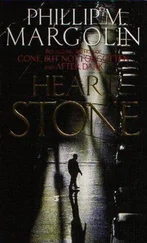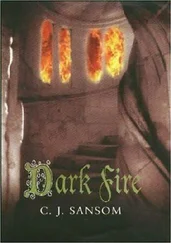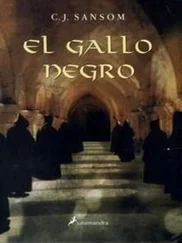'Even if I go, Goodryke won't let it lie. You can hang for desertion now.'
Before I could reply I felt a touch on my arm. It was Bess Calfhill, dressed in black again. She looked nervous.
'Am I late?' she asked. 'I feared I was lost among all these buildings and alleyways—'
'No, Mistress Calfhill. Come, we should go in. We'll talk afterwards, Jack.'
We climbed the stairs, walked under the coat of arms. I was relieved to see Reverend Broughton sitting on the bench in his cassock. He looked solid, determined. A little further up the bench Vincent Dyrick looked at me and shook his head slightly, as though amazed by the unreasonableness of the whole situation. Next to him young Feaveryear was ordering papers into a large bundle.
'Good morning,' I said to them, as cheerfully as I could for I had been worrying about Barak and Ellen for most of the night.
Bess looked anxiously at Dyrick. 'Where will the case be heard, sir?' she asked quietly. Dyrick nodded at the door to the court. 'In there, madam. But do not worry,' he added scoffingly, 'we will not be there long.'
'Now, Brother Dyrick,' I said reprovingly. 'You are for the defence, you are not allowed to talk to the applicant.'
Dyrick snorted. 'The late applicant's personal representative, you mean.'
Barak approached Feaveryear. 'That's some pile of paperwork you've got.'
'Bigger than yours,' Feaveryear replied in a tone of righteous resentment, staring at the much smaller bundle Barak carried.
'Oh, mine's always big enough for the job in hand. So my wife says, anyway,' Barak retorted. Feaveryear looked scandalized, then pointed a thin finger at the documents Barak carried. 'Those are tied in red ribbon,' he said. 'Papers for Wards require to be tied in black.' He nodded at the black ribbon round his own files.
Dyrick looked up. 'The applicant's bundles are in the wrong colour ribbon?' He stared at me. 'I have heard of cases being thrown out of Wards for lesser errors.'
'Then you must tell the Master,' I replied, cursing myself inwardly for my mistake. I had missed the rule in my haste.
'I will.' Dyrick smiled wolfishly.
The court door opened, and the black-robed usher I had seen in Mylling's office appeared. 'Those concerned in the wardship of Hugh Curteys,' he intoned. I heard a gasp of indrawn breath from Bess. Dyrick rose, his robe rustling as he strode to the door.
* * *
THE COURTROOM was the smallest I had ever entered. It was dimly lit by narrow arched windows set high in an alcove, the walls undecorated. Sir William Paulet, Master of the Court of Wards, sat at the head of a large table covered with green cloth, a wooden partition behind him blank save for the royal coat of arms. Beside him Mylling sat, his head lowered. The usher showed Dyrick and me to places at the table facing the Master. Barak and Feaveryear sat beside us. Bess Calfhill and Reverend Broughton were waved to seats separated from the body of the court by a low wooden bar.
Paulet wore the red robes of a judge, a gold chain of office round his neck. He was in his sixties, with a lined, hoary face and narrow lips above a short white beard. His large, dark blue eyes conveyed intelligence and authority but no feeling. I knew he had been master of the court since its founding five years before. Before that he had been a judge at the trial of Sir Thomas More, as well as a commander of the royal forces against the northern rebels nine years earlier.
He began by giving me a thin smile. 'Serjeant Shardlake. Master Dyrick I know, but I think you are new to my court.'
'Yes, Master.'
He stared at me for a long moment, frowning. I guessed he was annoyed by the Queen's interference in his court. He nodded brusquely at the papers in front of him. 'These are strange allegations. Please explain the matter.'
Dyrick half rose. 'If I may mention a point of procedure, Master, the papers of the claimant's personal representative are not in the correct form. The ribbon should be black—'
'Do not be silly, Brother Dyrick,' Paulet said quietly. 'Sit down.'
Dyrick flushed but remained on his feet. 'And the papers, such as they are, were filed very late—'
'Sit down .'
Dyrick did so, frowning. He had hoped to earn me at least a reproving word from the judge. Paulet turned back to me. 'Yes, Serjeant Shardlake?'
I made the best of my weak case. Quills scratched as Barak, Feaveryear and Mylling took notes. I explained Michael's long association with the Curteys children, his good character and record as a tutor, and his serious concern about Hugh after his recent visit to Hampshire. I said his mother believed his complaint warranted urgent investigation.
When I had finished, Paulet turned and stared at Bess for perhaps half a minute. She flushed and shifted in her seat, but returned his gaze steadily. Broughton put his hand over hers, earning him a glance of disapproval from the Master. Then Paulet turned back to me.
'Everything depends on the mother's evidence,' he said.
'It does, Sir William.'
'The applicant's death is a strange matter. A suicide, he must have been sick in his mind.' There was a suppressed sob from Bess, which Paulet ignored.
I said, 'Master, something which may have tipped this man of good character over the edge of reason must be serious indeed.'
' May be serious, Master Shardlake. May be.' Paulet turned to Dyrick. 'I will hear from Master Hobbey's representative. Master Hobbey himself is absent, I see.'
Dyrick rose. 'My client is busy with contracts to supply the fleet and army at Portsmouth with wood, work of national importance.' He looked at me. 'From his own woodlands, I should add.'
Paulet considered a moment. 'I understand no marriage is in prospect for the ward.'
'No, indeed. Master Hobbey would not wish his ward to marry till he finds a lady of his own choice.' Dyrick's voice rose. 'As we know, the man who lodged this extraordindary bill is dead. His mother's evidence is mere hearsay. And Reverend Broughton's deposition deals only with allegations relating to the grant of the wardship many years ago.' His voice took on a reproving note. 'That wardship went through the due and proper processes of the Office of Wards, predecessor to this honourable court.'
Paulet nodded. 'Very true.' He stared at Broughton. 'I think you a naughty fellow, sir, to stir up trouble now over how the wardship was granted.'
Broughton rose. 'I have told only the truth, as God is my witness.'
'Do not bandy words with me, or I will have you in the Fleet for contempt.' Paulet did not raise his quiet voice but it cut like a knife. Broughton hesitated, then sat down again. Paulet turned back to Dyrick and sighed.
'Michael Calfhill's allegations, however vague, do, I think, merit some investigation. Do you wish to question the witnesses?'
Dyrick stared at Bess. She looked back at him, lifting her chin. Dyrick hesitated, then said, 'No, Master.' I smiled inwardly. Dyrick had realized that questioning Bess on her statement would only reveal her total sincerity. I understood then that I had won this stage of the battle at least, and from the angry set of his face Dyrick did too. But I took no credit. I had seen enough of Paulet to realize that if pressure had not been brought on him by the Queen he would indeed have thrown us out the door of his strange fiefdom in minutes.
'I think,' Paulet said, 'the court should order depositions from all persons currently concerned with Hugh Curteys' welfare.' He looked at me. 'Whom did you have in mind, Serjeant Shardlake?'
'Hugh Curteys himself, of course. Master Hobbey, his wife, perhaps their son, the steward of the household. Any current tutor—'
'There is no tutor,' Dyrick said. He stood again, his face red with suppressed anger. 'And David Hobbey is a minor.'
Читать дальше












